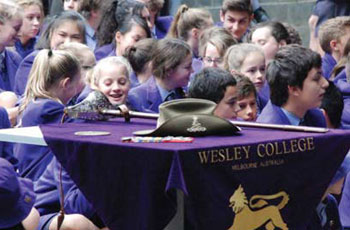
In many respects, the Prest Quadrangle at the Glen Waverley campus is the furthest place imaginable from the horror of World War One battlefields where Australians fought, ranging from the landing at Gallipoli, to Fromelles, Pozieres and Ypres on the western front. And yet, at the Anzac Day Service, the Vice President of the Wesley College Council, Philip Powell, succeeded in connecting present Glen Waverley students to the many Old Collegians who served in the Great War.
Situated amidst the green ovals of suburban Glen Waverley, it is all too easy for students to lose the memory of, and disconnect from, the history of Wesley College and its rich heritage of tradition, which at certain times involved military service. True, at the conclusion of the Anzac Day Service, Junior School students gathered outside the Senior School, and around the Aleppo Pine (descendant of the original Lone Pine tree of Gallipoli). However, what prevented the Aleppo Pine from being just another tree in the eyes of younger students, despite its rich poignancy and deep symbolism in regard to Wesley’s connection to the Gallipoli campaign, was Philip Powell’s ability to convey history in narrative form. He understood the students’ need to encounter not so much a physical symbol of World War One as a sense of shared experience, a spiritual and emotional connection transcending generations, linking present students of the Glen Waverley campus to Old Collegians of a hundred years ago.
Anzac Day, Philip suggested, is a day of memory. Not, he hastened to add, of nameless men, but of those once real students. For the Glen Waverley students, these Old Collegians came alive during the Anzac Day service. Mention was made of Captain William (Billy) Willis (OW1890), whose sword and medals adorned the table in the Prest Courtyard. Billy fought in the Boer War, before manning a very dangerous area at the top of Monash Valley called Pope's Hill, where, early in 1915, he was fatally shot. Or again, Philip made mention of the Battle of Broonseinde Ridge in Belgium (this battle was the worst day for Wesley Old Collegians in the Great War, with seven former students dying on Broonseinde Ridge). At this point, not a sound was heard, nor a fidget seen from assembled students.
Each name on the call of the Honour Roll was suddenly not just a name anymore; rather, with vivid description and empathy, Philip Powell brought these names to life, conjuring up past Australian Imperial Force students and appending a personality and personal history to each.
Given the coming sesquicentenary, it has never been so important that the Glen Waverley campus acknowledges and places before its student body the rich history and traditions of Wesley College. Philip Powell is from a Wesley family of prominence; he successfully, and in a timely manner, deepened the attachment of the Glen Waverley campus to Wesley’s sad moments in Australia’s military history.
